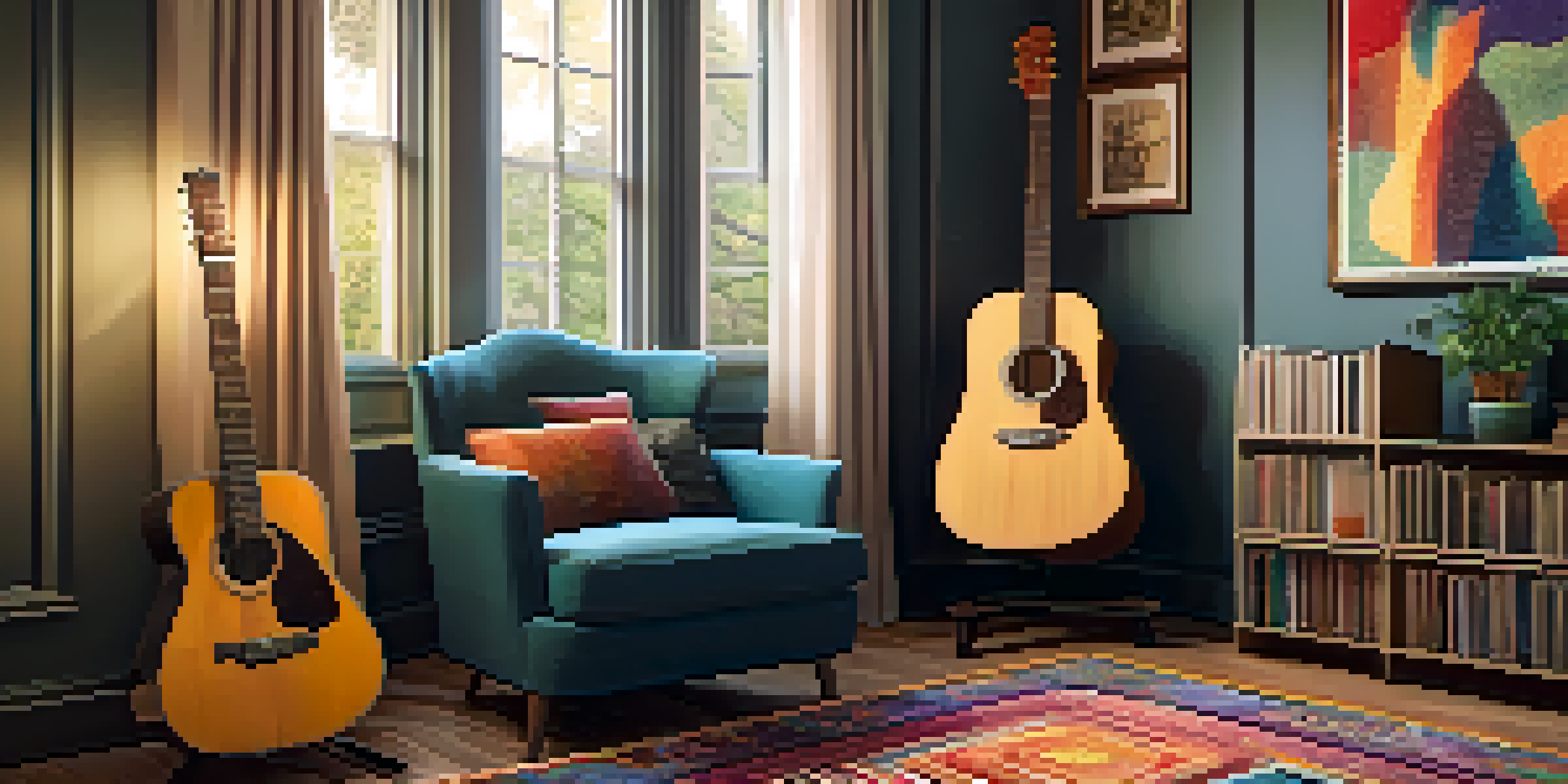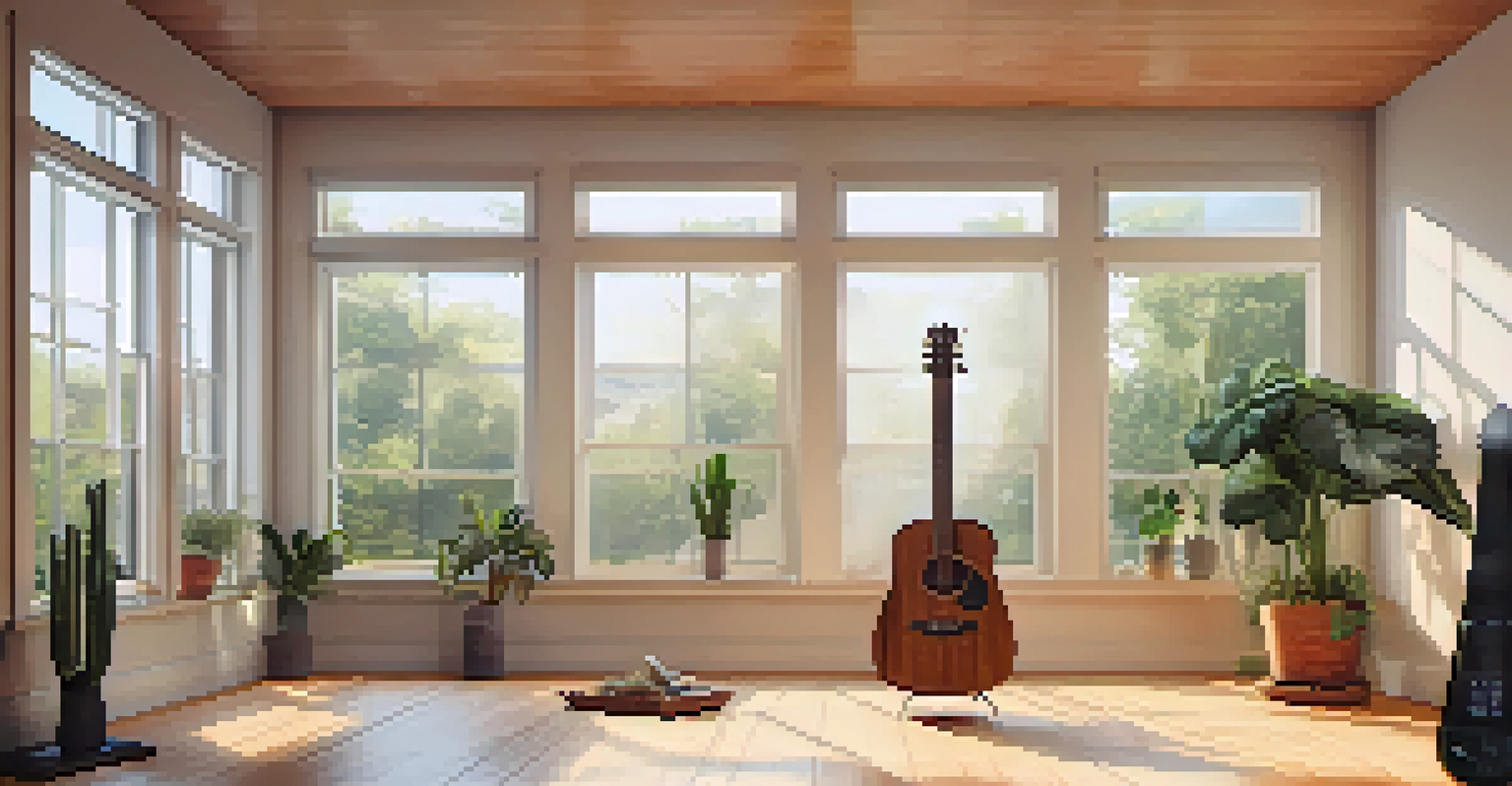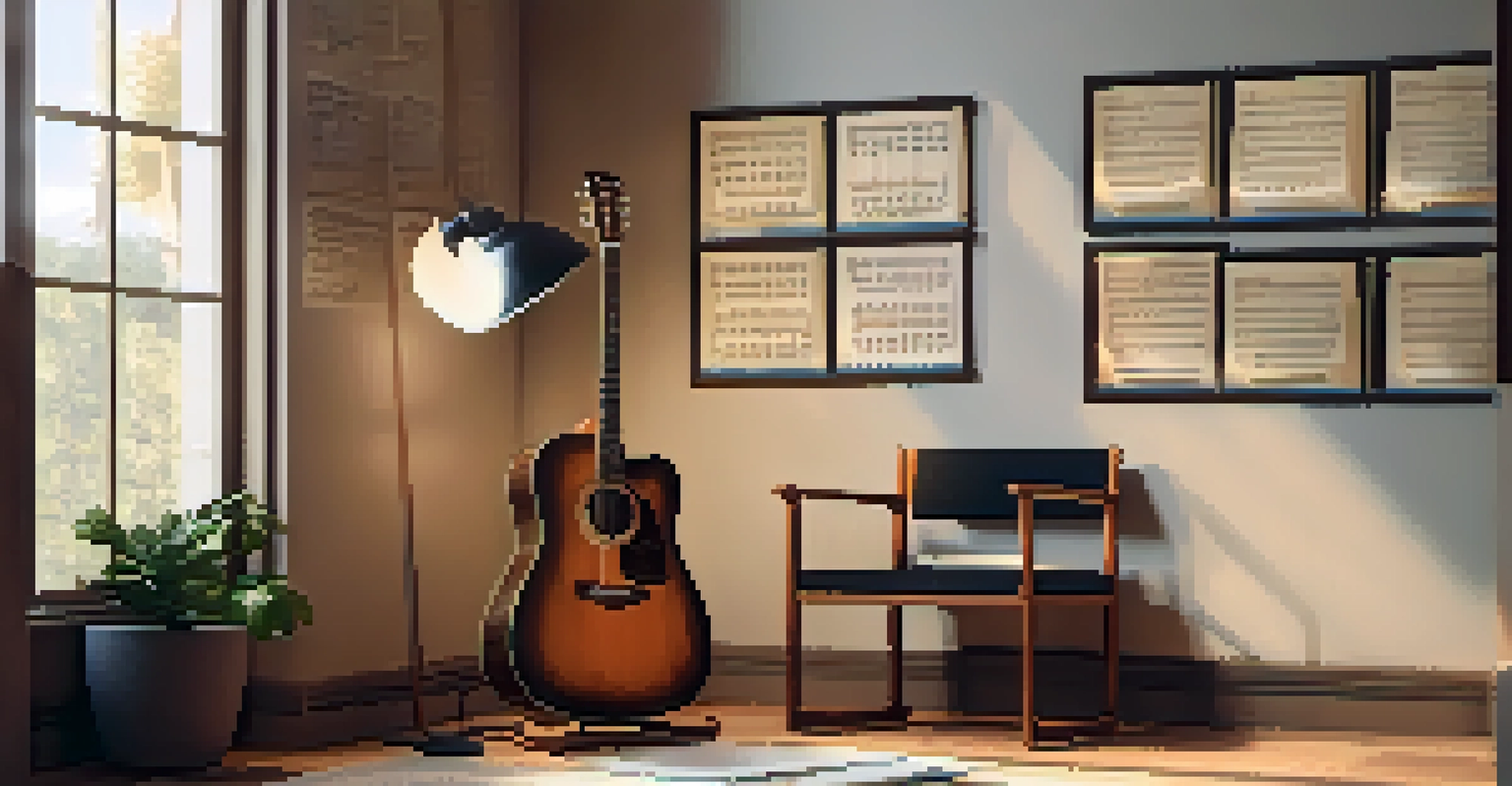How Room Size Influences Acoustic Guitar Sound Quality

Understanding Acoustic Guitar Sound Production
Acoustic guitars produce sound through the vibration of their strings, which is then amplified by the body of the guitar. The resonance chamber, or body, plays a crucial role in shaping the tone. This means that the quality of sound is not solely dependent on the guitar itself but also on its environment.
The quality of sound is not solely dependent on the guitar itself but also on its environment.
When you strum a chord, the strings vibrate and create sound waves. These waves bounce around the room and interact with the surfaces they encounter. If you're in a small, cluttered space, the sound waves may be absorbed or scattered, leading to a muted tone. In contrast, an open area allows for better sound projection and clarity.
Hence, understanding how sound production works helps us appreciate the importance of room size. A well-sized room can enhance the natural tones of an acoustic guitar, while inadequate space might hinder its true potential.
The Impact of Room Dimensions on Sound Quality
Room size plays a significant role in how sound behaves. A smaller room can create issues such as excessive reverberation and muddiness, which can distort the sound quality of an acoustic guitar. When sound waves bounce off walls too quickly, they can overlap and create a confusing mix of sounds.

On the other hand, a larger room often provides a more balanced acoustic environment. Here, sound waves have the space to travel and dissipate properly, allowing for clearer tones and better separation of notes. This is why many musicians prefer to practice in larger spaces that enhance their instruments' natural acoustics.
Room Size Affects Sound Quality
The dimensions of a room significantly influence how sound waves behave, impacting the clarity and tone of an acoustic guitar.
Ultimately, the room's dimensions directly influence how the guitar sounds, making it essential to consider room size when seeking optimal sound quality.
Influence of Room Shape on Acoustic Characteristics
While room size is important, the shape of the room can also significantly affect sound quality. For example, rectangular rooms can create uneven sound distribution due to parallel walls, leading to echoes and dead spots. This can make it difficult for musicians to hear their true sound, which can be frustrating.
Good acoustics allow for a clear representation of the guitar's sound, helping players to understand how their instrument interacts with the environment.
In contrast, rooms with irregular shapes or angled walls tend to diffuse sound waves more effectively. This diffusion helps to minimize standing waves and creates a more even auditory experience, allowing the acoustic guitar's sound to thrive. Think of it like cooking; the right pan shape can affect how evenly your dish cooks.
Therefore, considering both size and shape is critical for anyone serious about their acoustic guitar sound. An ideal space combines the right dimensions and angles to enhance musical performance.
The Role of Room Materials in Sound Quality
The materials used in a room can either help or hinder acoustic performance. Hard surfaces, like tile or concrete, reflect sound waves, which can lead to a bright and potentially harsh sound. While this might work for some styles, it can overshadow the warmth of an acoustic guitar.
Conversely, soft materials, such as carpets, curtains, and upholstered furniture, can absorb sound waves, reducing excessive brightness and creating a warmer ambiance. This absorption can help to balance the sound, making it richer and more pleasant to listen to. It's similar to how a cozy living room feels different from a stark, empty hall.
Room Shape Matters for Acoustics
The geometric layout of a room can create uneven sound distribution, while irregular shapes help diffuse sound more effectively.
Thus, the choice of materials in your practice space can dramatically impact the overall sound quality of your guitar, emphasizing the need for thoughtful room design.
Importance of Room Acoustics for Musicians
Room acoustics refer to how sound behaves within a space and is fundamental for musicians. Good acoustics allow for a clear representation of the guitar's sound, helping players to understand how their instrument interacts with the environment. This is especially crucial for live performances, where sound quality can make or break the experience.
When musicians are aware of their room’s acoustics, they can make informed decisions about where to play and how to adjust their techniques. For instance, they might choose to position themselves in a corner or near a specific wall to achieve a desired sound. Understanding these nuances can elevate a performance from good to great.
Therefore, musicians should prioritize learning about their environment to maximize their acoustic guitar's potential.
Practical Tips for Optimizing Your Practice Space
To improve sound quality, musicians can take several practical steps. First, consider the size and shape of your room; if it’s too small or too rectangular, think about rearranging furniture or even moving to a different space. Sometimes, even minor adjustments can make a big difference in how sound travels.
Next, incorporate soft materials into your room. Adding rugs, curtains, or cushions can help absorb sound and create a more balanced acoustic environment. This doesn’t just improve sound quality; it also makes the space more inviting and comfortable for practice.
Materials Influence Acoustic Performance
The choice of hard or soft materials in a room can either enhance or diminish the warmth and richness of an acoustic guitar's sound.
Finally, experiment with your positioning within the room. Small changes, like moving a few feet from a wall or closer to a corner, can drastically alter how sound is perceived. The goal is to find the sweet spot where your guitar sounds its best.
Conclusion: Finding Your Perfect Acoustic Space
In conclusion, the size and characteristics of a room can profoundly influence the sound quality of an acoustic guitar. Understanding how these factors interact helps musicians create an environment that enhances their instrument's natural tones. Whether you’re a seasoned player or just starting, recognizing the importance of your practice space is key.
As you experiment with different room sizes, shapes, and materials, you'll discover what works best for you and your guitar. Remember, every space is unique, and what sounds great in one room may not in another. Embrace the journey of finding your ideal acoustic environment.

Ultimately, a well-chosen space can transform your playing experience, allowing you to fully appreciate the beauty of your acoustic guitar's sound.